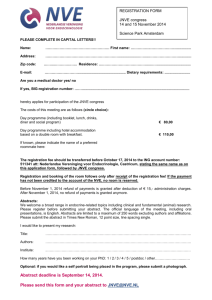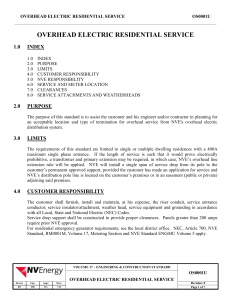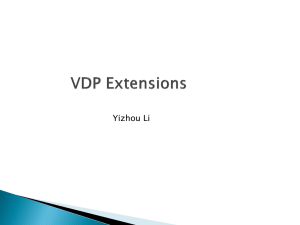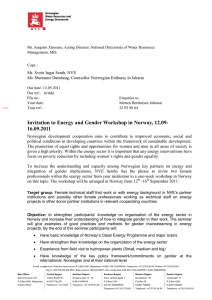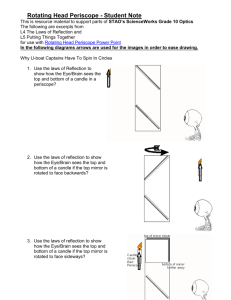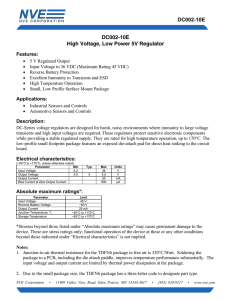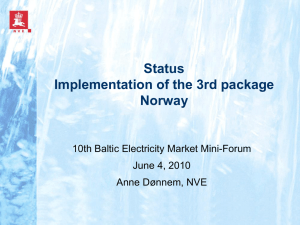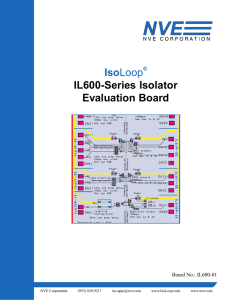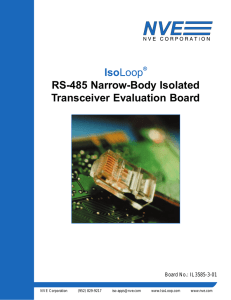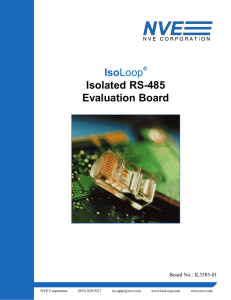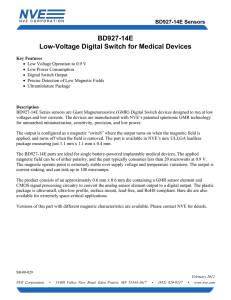RR-2 - NV Energy
advertisement
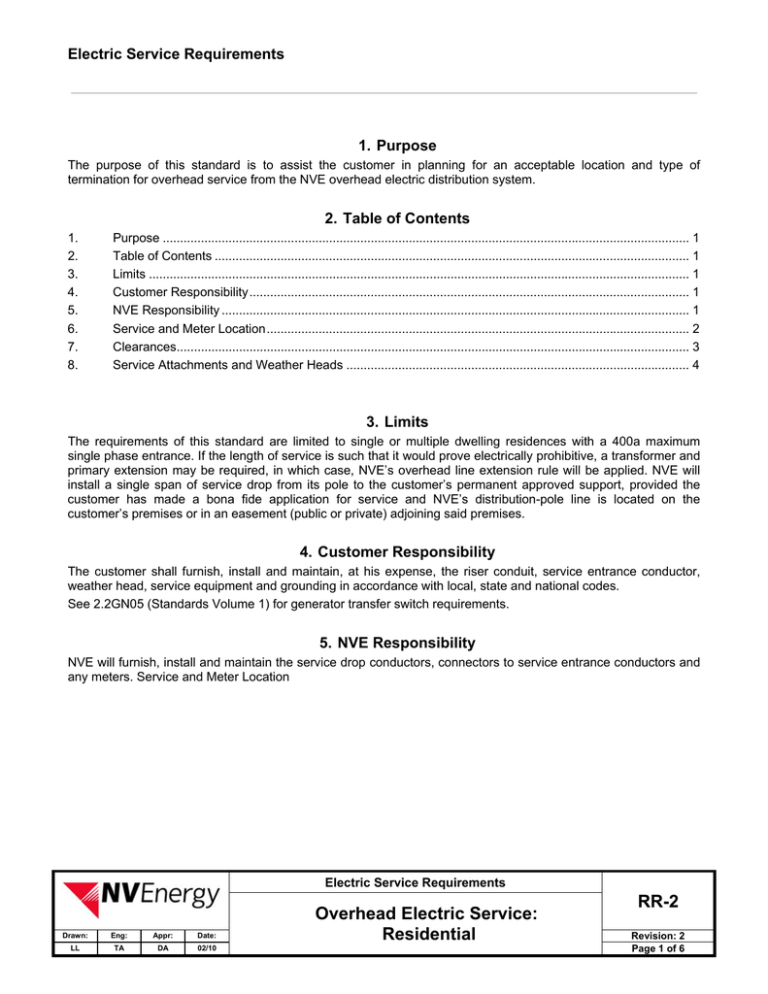
Electric Service Requirements 1. Purpose The purpose of this standard is to assist the customer in planning for an acceptable location and type of termination for overhead service from the NVE overhead electric distribution system. 2. Table of Contents 1. 2. 3. 4. 5. 6. 7. 8. Purpose ........................................................................................................................................................ 1 Table of Contents ......................................................................................................................................... 1 Limits ............................................................................................................................................................ 1 Customer Responsibility ............................................................................................................................... 1 NVE Responsibility ....................................................................................................................................... 1 Service and Meter Location .......................................................................................................................... 2 Clearances.................................................................................................................................................... 3 Service Attachments and Weather Heads ................................................................................................... 4 3. Limits The requirements of this standard are limited to single or multiple dwelling residences with a 400a maximum single phase entrance. If the length of service is such that it would prove electrically prohibitive, a transformer and primary extension may be required, in which case, NVE’s overhead line extension rule will be applied. NVE will install a single span of service drop from its pole to the customer’s permanent approved support, provided the customer has made a bona fide application for service and NVE’s distribution-pole line is located on the customer’s premises or in an easement (public or private) adjoining said premises. 4. Customer Responsibility The customer shall furnish, install and maintain, at his expense, the riser conduit, service entrance conductor, weather head, service equipment and grounding in accordance with local, state and national codes. See 2.2GN05 (Standards Volume 1) for generator transfer switch requirements. 5. NVE Responsibility NVE will furnish, install and maintain the service drop conductors, connectors to service entrance conductors and any meters. Service and Meter Location Electric Service Requirements Drawn: Eng: Appr: Date: LL TA DA 02/10 Overhead Electric Service: Residential RR-2 Revision: 2 Page 1 of 6 Electric Service Requirements 6. Service and Meter Location All service drop locations shall be approved by NVE prior to construction of the service entrance. The location of the point of the attachment of the service drop at the building shall be such that it can be reached with a single span, 100 feet maximum from NVE’s pole with no overhang of adjacent property and with proper clearances maintained. This point of attachment will normally be on the building wall facing the nearest NVE line or on a periscope through the roof. The weather head shall not be located on any wall which is less than 24” from any common property line. When it is impractical to attach service drop below the level of the weather head, the termination shall not consist of more than 3 feet of exposed open wire and shall not extend around the corner of the building. A minimum of 18” of service entrance conductor shall be extended out of the weather head, so that an 8” drip loop can be obtained below the weather head. Meter facilities shall be located within the first ten feet of structure. The meter location must not be fenced or otherwise obscured from view of meter readers, or impair the access of operations personnel. Where NVE allows the meter facilities to be fenced, the customer shall provide a means for direct access by NVE personnel, (i.e., gate). NVE Overhead Distribution SERVICE DROP 100' MAX. WALL SERVICE DROP 18" 10' MAX. 18" 10' MAX. ROOF AREAS IN WHICH PERISCOPE TYPE SERVICES ARE PREFERRED ROOF AREAS IN WHICH PERISCOPE TYPE SERVICES ARE PERMITTED P L WALLS ON WHICH SERVICE DROP ATTACHMENTS ARE PERMITTED P L NOTES: 1. Service drop shall be attached to the wall facing the nearest NVE pole line. 2. If a preferred location is not practicable, consult NVE in regard to an alternate location. 3. All service locations are subject to NVE approval. Installation of additional facilities at the customer’s expense or future relocation at his expense may be prevented by early consultation of NVE. 4. A working space (36”x36”x78”) in front of all meters is required to permit installation and provide a safe working environment for NVE personnel. Any exception from this requirement must be approved by NVE. 5. The customer for architectural reasons may conceal or recess the service entrance and meter in through the outside wall where permitted by local codes. For detailed cabinet requirements, see GM0001M, Electric Metering General, Section 5.2. For detailed service equipment requirements, see RM0001M, Electric Metering Residential. Electric Service Requirements Drawn: Eng: Appr: Date: LL TA DA 02/10 Overhead Electric Service: Residential RR-2 Revision: 2 Page 2 of 6 Electric Service Requirements 7. Clearances The minimum acceptable clearances for overhead service drops are outlined in National Electric Safety Code / G.O. 95. Upon request, your NVE representative will specify a point of attachment which will provide the required clearance of the service wires above thoroughfares and structures and from windows, doors, and exits of buildings. 18' PER G.O. 95 16' PER NESC 16' PER G.O. 95 CENTER OF ROAD EDGE OF ROAD 15.5' PER NESC 12' ER G.O. 95 OVER DRIVEWAYS HOUSE 10' MIN AT HOUSE WEATHERHEAD (5' MAX) 2" MIN. RISER STEEL 24" MAX. SERVICE SERVICE DROP Radial distance between point of service attachment and weather head shall not exceed 24". A minimum clearance of 36" must be maintained from service entrance conductors to all openings. 10' MIN. 8' MIN FRONT CUSTOMER GAS METER (TYP.) 12" Min. from electrical conduit and 36" Min. from electrical panels SIDE REQUIRED CLEAR WORKING AREA 36" x 36" x 78" GROUNDING IN ACCORDANCE WITH NEC ARTICLE #250 ALL SERVICE EQUIPMENT SHALL BE MADE RAIN-TIGHT BY APPROVED FITTINGS BUILDING CLEARANCES SERVICE DETAILS Electric Service Requirements Drawn: Eng: Appr: Date: LL TA DA 02/10 Overhead Electric Service: Residential RR-2 Revision: 2 Page 3 of 6 Electric Service Requirements 8. Service Attachments and Weather Heads SHEETING STUD 5/8" BOLT, WASHER, AND BACKING PROVIDED BY BUILDER, EXTENDING 2" MIN. FROM FACE OF SIDING. 2" SIDING PREFERRED LOCATION SERVICE KNOP ALTERNATE LOCATION TOP VIEW SIDE VIEW Two types of service attachments are used by NVE, service knobs which attach to the building and periscopes which extend above the roof. Typical methods of attaching residential overhead service are illustrated in this section. Where the building is high enough to permit proper clearance, the service knob can be located on roof rafters or wall studs. Customer will provide backing for service knob (min. 2”x4”), securely anchored to building frame. Service knobs will not be attached to roof fascia or wall sheeting unless proper backing is provided. UNBRACED PERISCOPE BRACED PERISCOPE 18" Min. Leads 10" 26" min. 30" max. 5' max. Connections at 18" min. 4' max. 4' max. 4' max. Brace Periscope Service Drop Brace TOP VIEW A periscope should be used when proper clearances cannot be maintained with a service knob attachment. Periscope to be minimum 2” rigid steel securely fastened to building stud. Periscope to extend minimum of 26” above roof. See NEC 230-B. Electric Service Requirements Drawn: Eng: Appr: Date: LL TA DA 02/10 Overhead Electric Service: Residential RR-2 Revision: 2 Page 4 of 6 Electric Service Requirements NOTES: 1. Periscope structures projecting over 30” above the roof must be braced against the pull of the service drop conductors. Bracing, when required, shall consist of two galvanized steel members installed at approximately 90 spread. Minimum size shall be ¾” galvanized steel pipe or 1-1/4” x 1-1/4” x 1/8” galvanized steel angle. Periscope bracing shall be anchored through subroof with minimum 3/8” galvanized carriage bolts. 2. Riser conduit will not have couplings above the roof. 3. Point of attachment of service drop must be high enough to meet required clearance. 4. Alternate service attachment points must not be more than 24” from weather head. 5. Service conductor must extend minimum 18” from weather head. 6. A ladder will not be used during installation of terminations. Electric Service Requirements Drawn: Eng: Appr: Date: LL TA DA 02/10 Overhead Electric Service: Residential RR-2 Revision: 2 Page 5 of 6 Electric Service Requirements THIS PAGE INTENTIONALLY LEFT BLANK Electric Service Requirements Drawn: Eng: Appr: Date: LL TA DA 02/10 Overhead Electric Service: Residential RR-2 Revision: 2 Page 6 of 6
